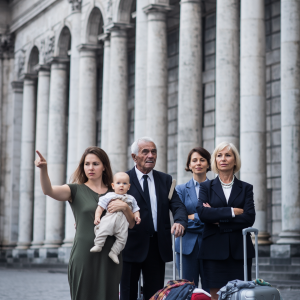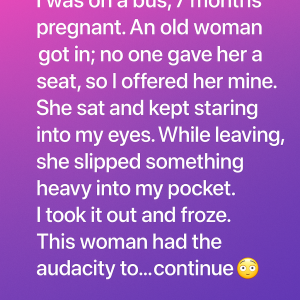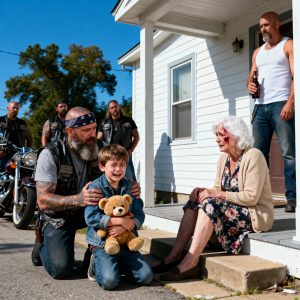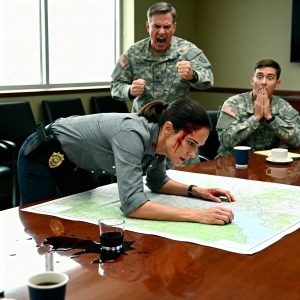The hospital lobby carried a silence that wasn’t peaceful — it was the kind that settled after hope had quietly slipped away. People stared into paper coffee cups, holding them like lifelines, avoiding each other’s eyes.
When the elevator doors slid open again, almost no one looked up. Almost.
The receptionist did.
A boy stood there. Alone.
Barefoot. Dust smeared across his legs. A faded hoodie hung loosely from his shoulders, clearly meant for someone much bigger. No parents in sight. No visitor badge.
Only a pair of steady eyes scanning the room like he already knew exactly where to go.
“Sweetheart, are you lost?” the receptionist called gently.
He didn’t answer. He just walked forward — past security, past murmuring nurses — and stepped into the elevator.
Upstairs, in Room 317, Richard Blake sat in a plastic chair, clutching his unconscious daughter’s hand. Twelve days in a coma. Twelve days of “wait and see” from doctors who didn’t expect change.
The rhythmic beeps of the monitors were the only proof she was still here.
The door clicked open. Richard didn’t look up until a quiet voice broke the stillness.
“I can help.”
A boy stood there — no more than eleven — clothes worn, hair slightly messy. His expression was calm in a way that felt out of place.
“You’re in the wrong room, son,” Richard rasped.
“I’m not lost,” the boy replied. “She is.”
“She’s far away,” he continued, stepping closer. “I can bring her back.”
Richard’s instinct screamed this was nonsense. And yet, something in the boy’s tone — no hesitation, no doubt — kept him from calling for a nurse.
“You have one minute,” Richard said.
The boy nodded. He stopped beside the bed, holding his hand just above Emily’s forehead, not touching but close — like feeling something only he could sense.
He closed his eyes. The air seemed to still. Even the machines felt quieter.
“Emily,” he whispered, “your dad’s here. He’s waiting for you. It’s not time to rest yet.”
Richard couldn’t look away.
“You remember the carousel? The park? The way you laugh when you win at chess? That’s still here. Waiting.”
Emily’s fingers twitched.
“She hears you now,” the boy said softly.
Richard leaned forward. “Sweetheart, it’s Dad. I’m right here.”
Her eyelids fluttered… then opened.
“Dad?”
Tears blurred his vision. “Yes, baby. Yes.”
Nurses flooded in, alarms chirping, voices buzzing. In the chaos, Richard turned to thank the boy — but he was gone.
Security footage later showed no trace of him arriving or leaving.
Two nights later, Emily whispered, “Dad, he was with me. I couldn’t find the way back, but he took my hand and showed me.”
Richard never forgot those words.
Weeks later, passing the lobby with Emily’s hand in his, the receptionist caught his eye.
“When he walked by me,” she said quietly, “I asked where he was going. He said, ‘Some people need a map. I am one.’”
Richard felt a chill — and peace. Somewhere, someone else would be lost. And maybe, someday, a barefoot boy would appear for them too.





